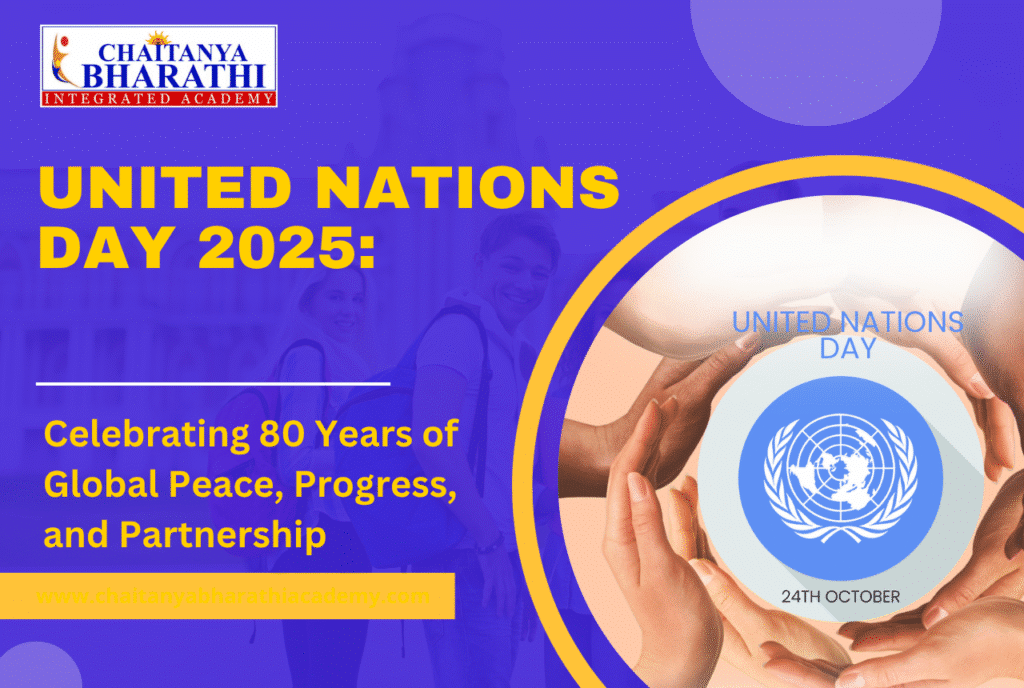Every year on October 24, the world comes together to celebrate United Nations Day 2025—a day dedicated to honoring the establishment of the United Nations and reflecting on its critical role in promoting global peace, human rights, and sustainable development. In 2025, this observance takes on even greater significance as the UN marks its 80th anniversary, celebrating eight decades of international cooperation and collective action.
But what exactly is United Nations Day? Why is October 24 so important? And how can individuals, communities, and nations participate in this meaningful global celebration in 2025?
This comprehensive guide explores the history behind UN Day, the significance of the UN’s 80th anniversary, the organization’s remarkable achievements, and practical ways you can honor this special day while contributing to a better world.
What is United Nations Day?
United Nations Day is an annual commemorative day that marks the official creation of the United Nations on October 24, 1945. The United Nations General Assembly declared in 1947 that October 24, the anniversary of the Charter of the United Nations, should be devoted to making known to people worldwide the aims and achievements of the United Nations and gaining their support for its work.
In 1971, the United Nations General Assembly adopted a resolution declaring that United Nations Day shall be an international observance and recommended that it should be observed as a public holiday by UN member states.
United Nations Day serves multiple purposes:
Commemorating the UN Charter: The day celebrates the moment when the UN Charter came into force, establishing the framework for international cooperation and peacekeeping.
Raising Awareness: It provides an opportunity to educate people about the UN’s vital work in addressing global challenges from poverty and disease to climate change and human rights violations.
Promoting Unity: The observance emphasizes our shared humanity and the importance of working together across borders to solve common problems.
Inspiring Action: UN Day encourages individuals and communities to engage with global issues and contribute to the UN’s mission of creating a more peaceful, just, and sustainable world.
When Is United Nations Day 2025?
United Nations Day 2025 falls on Friday, October 24, 2025. This date remains consistent every year, as it commemorates the specific day in 1945 when the UN Charter officially came into effect after being ratified by the majority of its signatories, including the five permanent members of the Security Council.
Mark your calendar for October 24, 2025, and prepare to join millions around the world in celebrating international cooperation and the pursuit of global peace.
The UN at 80: A Historic Milestone in 2025
The United Nations celebrates its 80th anniversary in 2025, marking eight decades of work in promoting peace, human rights, and social progress, including access to healthcare and education. The UN has improved the lives of people around the world, creating better living standards for all.
This landmark anniversary provides an opportunity to reflect on the UN’s journey from its founding in the aftermath of World War II to its current role as the world’s primary forum for international cooperation.
The Vision Behind the UN
UN Secretary-General António Guterres notes that “eight decades later, one can draw a direct line between the creation of the United Nations and the prevention of a third world war.” The UN was born from the ashes of global conflict with a singular mission: to save succeeding generations from the scourge of war.
UN 80 Initiative
In March 2025, the Secretary-General launched the UN80 Initiative to transform how the UN works—identifying efficiencies, reviewing how mandates are implemented, and examining potential structural changes and programme realignment within the United Nations system.
This modernization effort ensures the UN remains relevant and effective in addressing 21st-century challenges.
The History Behind United Nations Day
Understanding the origins of UN Day helps us appreciate its significance today.
Early Origins During World War II
The first event called “United Nations Day” was a World War II Allies’ day of solidarity and military parades launched by US President Franklin D. Roosevelt tied to US Flag Day on June 14, 1942, six months after the Declaration by United Nations. It was observed in New York City as the “New York at War” parade, in London, and by the Soviet and Chinese governments.
It was observed throughout World War II, during 1942-1944, though prior to the foundation of the UN itself, it was not directly connected to the current international observance.
The Birth of the Modern UN
The ideas around the United Nations developed during the final years of World War II, particularly during the UN Conference on International Organization in San Francisco, beginning on April 25, 1945. The UN was officially created when the UN Charter was ratified on October 24 that year.
Official Recognition
United Nations Day was first observed on October 24, 1948. Since then, it has been celebrated annually, with increasing participation from countries, organizations, and individuals worldwide.
Why October 24 Is Special: Understanding the UN Charter
The UN Charter is a landmark document that represents the dreams, aspirations, and hopes of “we the peoples.”
The Charter established the foundational principles that guide the UN’s work:
Maintaining International Peace and Security: Through peacekeeping operations, conflict mediation, and diplomatic efforts.
Developing Friendly Relations Among Nations: Based on respect for equal rights and self-determination of peoples.
Achieving International Cooperation: In solving international economic, social, cultural, and humanitarian problems.
Promoting Human Rights: Encouraging respect for human rights and fundamental freedoms for all without discrimination.
Serving as a Center for Harmonizing Actions: Providing a platform where nations can work together toward common goals.
These principles, enshrined in the Charter on October 24, 1945, continue to guide the UN’s mission 80 years later.
The UN’s Remarkable Achievements Over 80 Years
The United Nations has made extraordinary contributions to global progress across multiple areas:
Peace and Security
The UN currently deploys tens of thousands of peacekeepers across 11 operations to help countries navigate the difficult path from conflict to peace. It has facilitated the adoption of nearly 30 disarmament treaties and ensured the destruction of over 55 million landmines.
The UN’s peacekeeping missions have saved countless lives and helped rebuild societies torn apart by conflict.
Health and Well-being
Over the last eight decades, UN health agencies have vastly improved child and maternal mortality, saved millions of lives with immunization, and prevented and controlled the spread of deadly diseases like malaria, tuberculosis, and HIV/AIDS.
Humanitarian Assistance
The UN assists and protects more than 100 million people every year through humanitarian programmes. The UN has the legitimacy, knowledge, skills, and logistical capacity to deliver in ways no other organization can.
Human Rights Protection
The UN stands up for justice and respect for human rights. It documents human rights violations worldwide, advocates for robust human rights protections, promotes compliance with international laws and standards, and supports governments in their reform efforts through work in over 90 countries.
Sustainable Development
The UN has been instrumental in reducing extreme poverty by more than half globally, helping establish universal primary education, and coordinating international efforts to address climate change and environmental degradation.
Decolonization
The UN’s decolonization efforts led to the independence of numerous former colonial territories, adding many new member states and promoting self-determination for millions of people.
Current Challenges and the Path Forward
While celebrating 80 years of progress, the UN also acknowledges significant challenges that require renewed commitment and innovation.
Emerging Global Threats
Eighty years after its founding, the United Nations faces new challenges. The climate crisis is raging, inequalities are growing, and poverty is on the rise. Terrorism and the nuclear threat persist, and new threats have emerged as artificial intelligence becomes ubiquitous, rushing ahead of regulation.
The Pact for the Future
In September 2024, at the Summit of the Future, the members of the United Nations recommitted to facing these challenges together by signing on to the Pact for the Future.
The Pact aims to strengthen global cooperation for the 21st century and rebuild trust in multilateralism, the UN, and the Security Council. Provisions include advancing coordination with regional organizations and ensuring the full participation of women, youth, and marginalized groups in peace processes.
UN 2.0: Modernization for the Future
Guided by the Secretary-General’s “Our Common Agenda” report, which calls for stronger global governance, multilateral cooperation, and institutional reforms, the UN 2.0 process is a modernization initiative aimed at transforming the United Nations to be more agile, data-driven, and digitally innovative, aligning with 21st-century challenges.
How United Nations Day 2025 Will Be Celebrated Worldwide
On and around October 24, many activities are organized by all parts of the UN, particularly in the main offices in New York, the Hague (Netherlands), Geneva (Switzerland), Vienna (Austria), and Nairobi (Kenya). These include concerts, flying the UN flag on important buildings, debates on the relevance of the work of the UN in modern times, and proclamations by state heads and other leaders.
At UN Headquarters and Offices
Special ceremonies, exhibitions, and events will take place at UN facilities around the world, showcasing the organization’s work and bringing together diplomats, staff, and the public.
Educational Events
This year’s United Nations Day will be commemorated on October 24 at various locations under themes emphasizing the vital role of inclusive and high-quality education in achieving the Sustainable Development Goals.
Schools and universities worldwide will organize:
- Seminars and panel discussions on global issues
- Student art competitions and exhibitions
- Model UN conferences
- Film screenings and documentary presentations
- Essay and debate competitions
Community Celebrations
International schools and cultural centers often celebrate the diversity of their communities on UN Day through:
- Cultural performance showcases
- International food fairs representing cuisines from around the world
- Photography and book exhibitions
- Social media campaigns using official UN Day hashtags
Official Recognitions
In the United States, the President has issued a proclamation each year for United Nations Day since 1948. Many other countries follow similar traditions, with government leaders issuing statements of support for the UN’s mission.
Major UN Conferences and Initiatives in 2025
In 2025, major conferences present opportunities to advance the UN’s vital work.
UN Ocean Conference (June 9-13, 2025)
The third UN Ocean Conference aims to accelerate action to conserve and sustainably use the world’s ocean, which covers over 70% of the Earth’s surface, regulates major environmental balances, and provides vast resources and biodiversity.
Financing for Development (June 30 – July 3, 2025)
The fourth International Conference on Financing for Development aims to be a key moment to close the SDG financing gap, including by advancing the SDG stimulus.
Summit for Social Development (November 4-6, 2025)
The second World Summit for Social Development aims to refocus action on the central pledge of the 2030 Agenda: that no one will be left behind, grounded in equity, social justice, and non-discrimination.
Climate Change Conference COP 30 (November 10-21, 2025)
The UNFCCC COP 30 will emphasize the need to mobilize financing to support developing countries in transitioning to greener economies, adapting to worsening climate impacts, and dealing with losses and damages caused by climate change.
How You Can Celebrate and Support United Nations Day 2025
Whether you’re a student, educator, professional, or concerned citizen, there are many meaningful ways to participate in UN Day 2025:
Educate Yourself and Others
- Learn about the UN’s work in different areas like peacekeeping, human rights, climate action, and sustainable development
- Watch documentaries about the UN’s history and current initiatives
- Read the UN Charter and familiarize yourself with the Sustainable Development Goals
- Share educational content on social media using hashtags like #UNDay2025 #UN80 #UnitedNationsDay
Attend Local Events
- Check with your local UN Information Centre for commemorative events
- Participate in Model UN conferences or simulations
- Attend lectures, panel discussions, or cultural celebrations in your community
- Join virtual events and webinars hosted by UN agencies
Support UN Causes
- Volunteer with organizations working on UN-aligned goals
- Donate to UN humanitarian programmes or specialized agencies
- Advocate for policies that support international cooperation and multilateralism
- Join campaigns addressing global issues like climate change, poverty, or gender inequality
Engage Your Community
- Organize a UN Day event at your school, workplace, or community center
- Host an international potluck celebrating global diversity
- Start a discussion group focused on global issues and solutions
- Create art, music, or writing that promotes peace and understanding
Take Action on the Sustainable Development Goals
The UN’s 17 Sustainable Development Goals provide a blueprint for achieving a better future for all. Choose one or more goals that resonate with you and take concrete action:
- SDG 1 (No Poverty): Support local food banks or economic empowerment programs
- SDG 4 (Quality Education): Tutor students or donate books to schools in need
- SDG 13 (Climate Action): Reduce your carbon footprint and advocate for climate policies
- SDG 16 (Peace, Justice, and Strong Institutions): Promote dialogue and understanding in your community
Display Solidarity
- Fly the UN flag if you have access to flagpoles in your community
- Wear blue, the UN’s official color, on October 24
- Use UN Day profile picture frames on social media
- Share messages of hope, unity, and international cooperation
India’s Significant Role at the United Nations
India has played a vital role in the UN since its inception and continues to be an important voice in global affairs.
As mentioned in our previous article on India’s role in the United Nations, India has been:
- One of the largest contributors to UN peacekeeping missions
- A strong advocate for UN Security Council reform
- An active participant in sustainable development initiatives
- A champion for the Global South and developing nations
- A key player in climate negotiations and global health initiatives
India’s commitment to multilateralism and the UN’s founding principles makes the country an essential partner in achieving the organization’s goals.
The Global Digital Compact and Future of Technology
The Pact for the Future contains a Global Digital Compact that calls for an AI governance body, which gives developing countries a seat at the table.
This initiative recognizes that technological advancement must be inclusive and equitable, ensuring that the benefits of digital innovation reach all nations and communities, not just the privileged few.
Why United Nations Day Matters More Than Ever
In our increasingly interconnected yet divided world, the UN’s role as a platform for dialogue, cooperation, and collective action has never been more critical.
Global Challenges Require Global Solutions
No single country can address climate change, pandemic preparedness, nuclear proliferation, or economic inequality alone. The UN provides the framework for nations to work together on these existential challenges.
Promoting Peace and Preventing Conflict
While conflicts continue in various regions, the UN’s peacekeeping, mediation, and diplomatic efforts have prevented countless wars and saved millions of lives over the past 80 years.
Protecting Human Rights
The UN sets international standards for human rights and provides mechanisms to hold violators accountable, giving voice to the voiceless and hope to the oppressed.
Building a Sustainable Future
Through the Sustainable Development Goals and climate agreements, the UN coordinates global efforts to ensure our planet remains habitable for future generations.
Fostering International Understanding
The UN brings together nations with vastly different cultures, political systems, and economic conditions, creating opportunities for dialogue and mutual understanding.
Lessons from 80 Years: What the UN Teaches Us
As we celebrate the UN’s 80th anniversary, several important lessons emerge:
Cooperation Beats Confrontation: The most effective solutions to global problems come through dialogue and partnership, not isolation and conflict.
Diversity Is Strength: The UN’s 193 member states bring different perspectives and experiences that enrich international problem-solving.
Persistence Pays Off: Many of the UN’s greatest achievements, from eradicating diseases to negotiating peace agreements, required years of patient, determined effort.
Everyone Has a Role: From world leaders to individual citizens, everyone can contribute to the UN’s mission of creating a better world.
Adaptation Is Essential: The UN continues to evolve and modernize, recognizing that staying relevant requires embracing new technologies, ideas, and approaches.
Teaching the Next Generation About the UN
United Nations Day 2025 is an excellent opportunity to educate young people about global citizenship and international cooperation.
For Parents and Educators
- Introduce children to different countries and cultures
- Explain how the UN works and why it matters
- Encourage critical thinking about global issues
- Foster empathy and understanding for people from different backgrounds
- Connect classroom learning to real-world UN initiatives
For Students
- Research a country that interests you and learn about its UN involvement
- Choose a Sustainable Development Goal and explore ways to contribute
- Participate in Model UN programs or similar activities
- Follow UN social media accounts to stay informed about global issues
- Consider careers in international relations, diplomacy, or development work
The Connection Between Local Action and Global Impact
One of the most powerful aspects of UN Day is recognizing that local actions contribute to global change.
When you reduce waste in your home, you’re supporting SDG 12 (Responsible Consumption and Production).
When you stand up against discrimination, you’re advancing SDG 5 (Gender Equality) and SDG 10 (Reduced Inequalities).
When you support quality education in your community, you’re contributing to SDG 4 (Quality Education).
Your individual choices and actions, multiplied across millions of people, create the collective impact needed to achieve the UN’s ambitious goals.
Looking Ahead: The UN’s Vision for the Future
As the UN enters its ninth decade, the organization’s vision remains clear: a world of peace, dignity, equality, and sustainability for all.
Our Common Agenda
In September 2021, the Secretary-General shared his recommendations to respond to current and future challenges in his report, “Our Common Agenda,” a wake-up call to speed up the implementation of the Sustainable Development Goals and propel the commitments contained in the UN75 Declaration.
This forward-looking document outlines priorities including:
- Strengthening global governance
- Ensuring universal access to digital technology
- Preparing for future pandemics
- Addressing climate change with urgency
- Promoting intergenerational equity
- Measuring progress beyond GDP
- Upgrading international cooperation
Conclusion: Your Role in the UN’s Mission
United Nations Day 2025 offers a unique moment to reflect on 80 years of international cooperation while looking forward to the challenges and opportunities ahead. The UN remains the essential, one-of-a-kind meeting ground to advance peace, sustainable development, and human rights.
On October 24, 2025, as millions around the world commemorate this special day, remember that the United Nations is not just an organization of diplomats and world leaders—it belongs to “we the peoples.” Your voice matters. Your actions count. Your commitment to peace, justice, and sustainability contributes to the UN’s mission.
Whether you attend a local event, engage in online discussions, volunteer for a cause, or simply learn more about global issues, you’re participating in something larger than yourself. You’re joining a worldwide movement dedicated to building a better future for all humanity.












